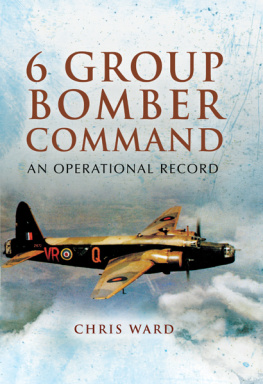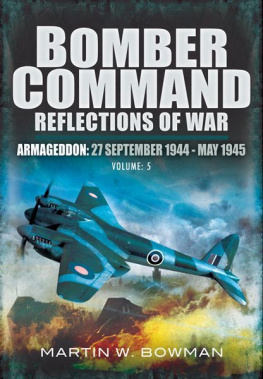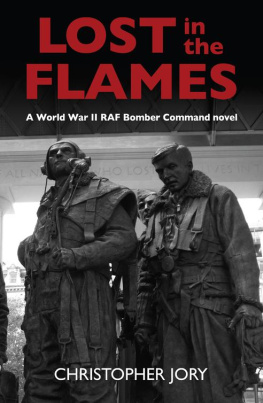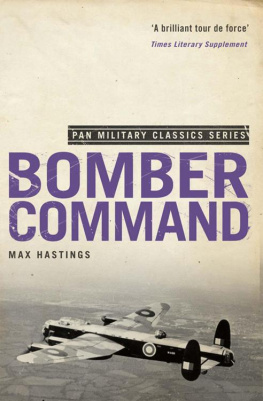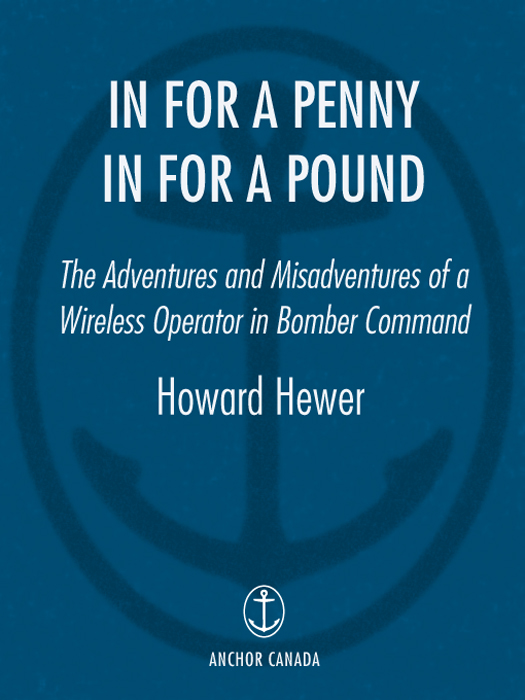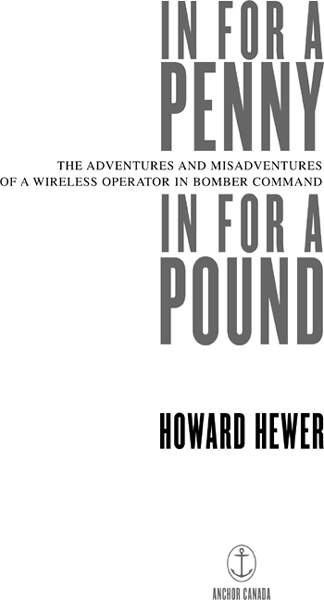To my wife, Doris, and
to our son Robert and daughter Margaret,
and to those comrades with whom I trained and
flew who did not return
REQUIEM FOR AN AIR GUNNER
My brief, sweet life is over, my eyes no longer see,
No summer walks no Christmas trees no pretty girls for me,
Ive got the chop, Ive had it, my nightly ops are done,
Yet in another hundred years, Ill still be twenty-one.
R.W. Gilbert
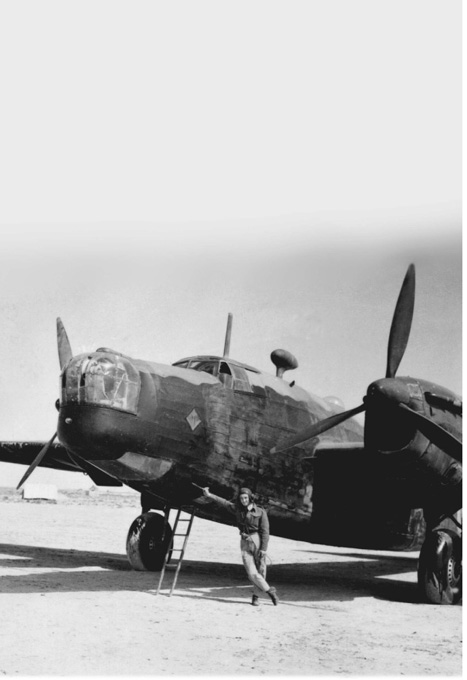
CONTENTS
PART I:
PART II:
PART III:
PART IV:
29
FOREWORD
BY GROUP CAPTAIN KENNETH MCDONALD, OBE, DFC, RAF (RETD)
M ANY BOOKS HAVE BEEN WRITTEN about the bomber war in Europe, the war that Adolf Hitlers former armaments minister, Albert Speer, called the greatest lost battle on the German side and which opened up a second front long before the invasion of Europe.
Howard Hewer served in that war in Europe, but he served also in the extension of it that harried General Erwin Rommels Afrika Korps in the campaigns of the Western Desert. These two experiences alone were enough to set him apart from fellow airmen whose operations were confined to the European theatre.
But he was not content with those experiences. In intervals between his duties as wireless operator/air gunner in Wellingtons (Wimpys), this ninteen-year-old Canadian explored England and Scotland and helped air raid wardens pull bodies from a bombed London dance hall, during which he was himself wounded by German bomb splinters. Plagued by bronchitis, he was in hospital when he learned that his crew was about to leave for the Middle East. He talked his way out of hospital, rushed to the departure airfield, and was airborne for Gibraltar at 0400 the next day. En route, their Wimpy was hit by flak off the French coast, damaging the starboard wheel, but Bill Dixon got them safely down on the airfields short, and only, runway.
The continuation of his operational flying in the Mediterranean theatre would make a book of its own. Living conditions were bad enough at base airfields; at advanced landing grounds they were so bad, so lacking in amenities of the crudest sort, as to stand as a permanent blot on the records of successive commanding officers who failed in their first duty to care for the men under command.
Despite those conditions ground crews performed miracles to keep the Wimpys flying the aircrews dropped their bombs and strafed enemy installations in the cause of holding the Afrika Korps in check.
Hewer and his crew were part of air powers long arm. Yet they share with compatriots in Burma and Italy the fate of all military units too far from the centre of authority. Northwest Europe was where the European war would be decided. Northwest Europe was where the news was written and broadcast.
Bomber crews who survived the dark nights of Europe will read with admiration and respect Hewers matter-of-fact descriptions of low-level operations at night: laying their 4,000-pound bomb alongside a mole in Benghazi harbour; repeating that op two nights later, each op requiring an overnight stop en route at a primitive ALG and ten to eleven hours flying time; and as the lone attacking aircraft, doing a timed run to drop a 4,000-pound bomb on the German headquarters at Tymbaki, on the south coast of Crete, after they had dropped (as briefed!) leaflets on the north coast town of Candia and thus alerted the defences. All three operations were flown in the space of six days.
Howard Hewer flew 300 operational hours in Wellington Marks I and II, but it was in between the spells of official ops that he got into different kinds of trouble. Among many episodes, this one stands out. Convalescing from serious illness in Cairo, and bored by the enforced inactivity, he offered his services to the Mechanical Transport Unit. While he was there, he volunteered to drive a truck as part of a two-vehicle survey some 400 miles westward into the desert, though he had never before driven a car. A British Army captain, Sergeant Hewer, and the captains corporal driver, set off on an expedition that took them far behind enemy lines. These and other remarkable adventures took three years of Howards young life.
PREFACE
ENGLAND EXPECTS THAT EVERY MAN WILL DO HIS DUTY
A DMIRAL NELSONS signal to the British fleet at Trafalgar was obviously meant to inspire his sailors, but according to diaries of the time, reactions to what became the most famous naval signal in history were not what might have been expected.
Crusty Admiral Collingwood grumbled, What is Nelson signalling about? We all know what we have to do. Some seamen complained, Weve always done our duty.
Those reactions reflect the fact that for centuries the soldiers and sailors of the British Isles have ever gone once more unto the breach, often poorly led, always in discomfort and danger.
Since the air wars of 19141918 and of the Second World War, the airmen of Britain and the Commonwealth have earned the right to take their place alongside their sailor and soldier comrades. If I have one overriding, lasting impression of my many hours of operational flying on Royal Air Force squadrons, it is of my aircrew and groundcrew comrades shrugging off their fears and hardships, their sometimes poor leadership, and even abuse, all the while pushing themselves to the limits of duty to King and Country.
He had been a gunner in the 3rd Brigade, Canadian Garrison Artillery, 11th Canadian Siege Battery, attached to the British Expeditionary Force (BEF) in Belgium in 1918, the last year of the First World War. Later I discovered that my uncle, Percy Ireland, had served in the Boer War in 1900. He had enlisted in Hamilton, Ontario, in the Lorne Rifles of Canada, which later joined the Canadian Mounted Rifles.
As soon as Canadas participation in the Second World War was confirmed by parliament, the countrys scant reserve forces were called up, recruiting offices were opened, and tens of thousands of Canadians enlisted in the Canadian Army, the Royal Canadian Navy, or the Royal Canadian Air Force. All were volunteers.
For the title of my story, I finally settled for In for a Penny, In for a Pound, partly for the aptness as the dictionary puts it, things once begun must be concluded at all costs but also because they were the first words to greet me on arrival at our first operational squadron. An Australian flying officer, cap at a jaunty angle and a holstered revolver slung dramatically on his hip, welcomed us in August 1941, with, Well, chaps, the glamour period is over. You got in for a penny, but now youre in for the pound! How right he was!
ACKNOWLEDGMENTS
I am indebted to many people who encouraged me to persevere with this story when I began to flag under the stress of recalling the wartime events of over fifty years ago, and the strain, at my age, of having to unravel the complexities of a computer word processing program enough to produce a manuscript.
First of all, I wish to express my gratitude to Bill Dixon, my former pilot, and captain of our bomber crew, not only for making it possible for both of us to be here, but for correcting some of my narrative where it relates to piloting, for confirming the details of our operational record, and for contributing the introduction.


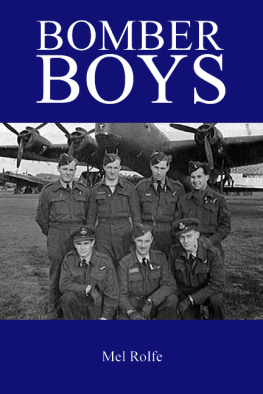

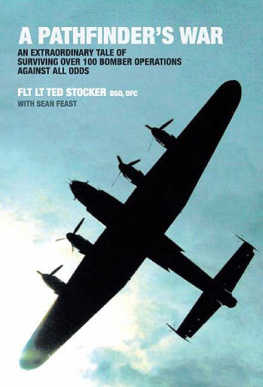
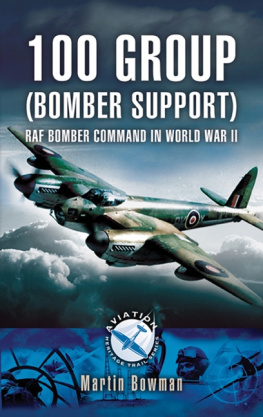
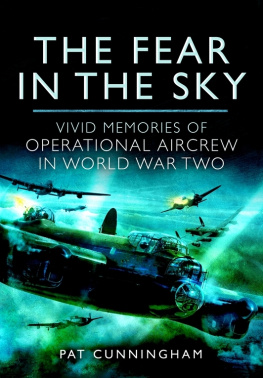
![Bar Wing Commander Guy P. Gibson VC DSO - Enemy Coast Ahead [Illustrated Edition]](/uploads/posts/book/180257/thumbs/bar-wing-commander-guy-p-gibson-vc-dso-enemy.jpg)
